AI in Healthcare: Top Tools for Professionals (in 2026) | Improve Patient Care
Are you a healthcare professional drowning in paperwork? Do you feel like you spend more time typing reports than treating patients?
You went into medicine to help people, not to be chained to a computer.
All that administrative work is consuming your time, leaving you stressed and your patients waiting.
But what if there was a way to cut your paperwork time in half?
That is where AI tools come into action. These smart assistants are changing the game, helping doctors and nurses work smarter, not harder. Imagine having a super-smart helper that can write reports, organize patient info, and even suggest treatment options.
With AI tools like Elephas, you can spend less time on paperwork and more time doing what you love - caring for patients. So let's check out what these AI tools are and what kind of help they are providing for healthcare professionals.
What are AI tools for Healthcare Professionals?
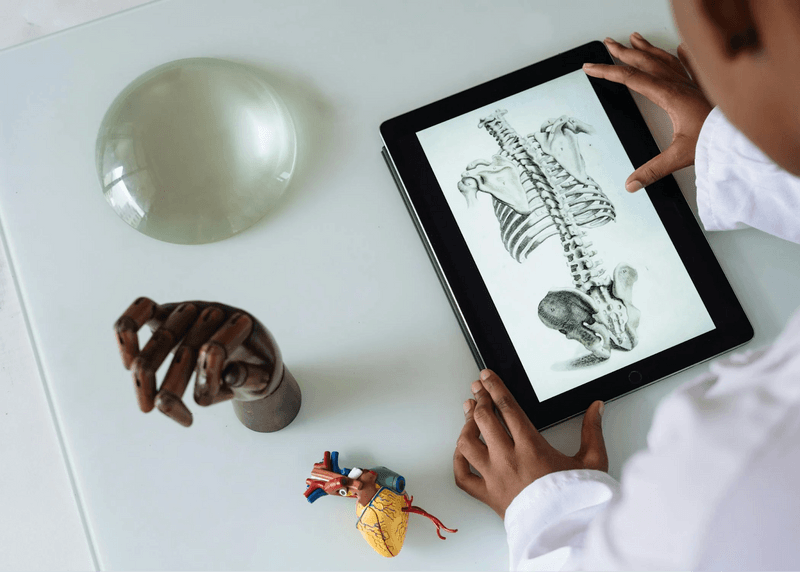
So, what's AI in healthcare? Simply put, it's using smart computer tech to help doctors, nurses, and other medical folks do their jobs better and faster. It's like having a super-smart assistant that can process tons of info and make predictions.
Now, there are some big, fancy AI systems out there in hospitals. They're doing amazing things like:
Helping doctors spot diseases more quickly and accurately
Speeding up the process of creating new medicines
Making surgery safer with robot helpers
Managing loads of patient data
These are awesome, but they're also pretty high-tech and expensive.
But here's the cool part – there are also AI tools that healthcare pros can use every day in their work. These are more down-to-earth and practical. Let me tell you about some things these tools can do:
Scheduling and reminders: AI can help manage appointments and send patients reminders. It's like having a super-efficient secretary!
Voice-to-text for notes: Doctors can speak their notes, and AI turns them into text. No more typing for hours!
Quick info lookup: AI can quickly find relevant info from medical databases. It's like having a medical library in your pocket.
Personalized treatment suggestions: By looking at a patient's history and symptoms, AI can suggest treatment options.
Spotting patterns in test results: AI can analyze lab results and flag anything unusual, helping catch issues early.
Medication management: These tools can check for drug interactions and suggest dosages based on patient info.
Language translation: In diverse communities, AI can help healthcare pros communicate with patients who speak different languages.
These tools aren't replacing healthcare professionals – they're just making their jobs a bit easier. It's like having a really smart helper that can do some of the time-consuming tasks, letting the pros focus on what's most important: caring for patients.
Many of these AI tools are becoming more accessible and user-friendly. You don't need to be a tech wizard to use them. They're designed to fit into the daily workflow of healthcare pros, making life a little easier and helping provide better care for patients.
So, while the big AI systems in hospitals are doing amazing things, these everyday AI tools are quietly revolutionizing healthcare too. They're helping healthcare pros work smarter, not harder.
Are There Any AI Tools that Can Help Healthcare Professionals
Yeah, they are tools that help healthcare professionals every day. You know, technology is changing the game in healthcare, and these AI tools are making life easier for doctors, nurses, and other medical folks. Let's see some of the best AI tools available for healthcare professionals.
Elephas
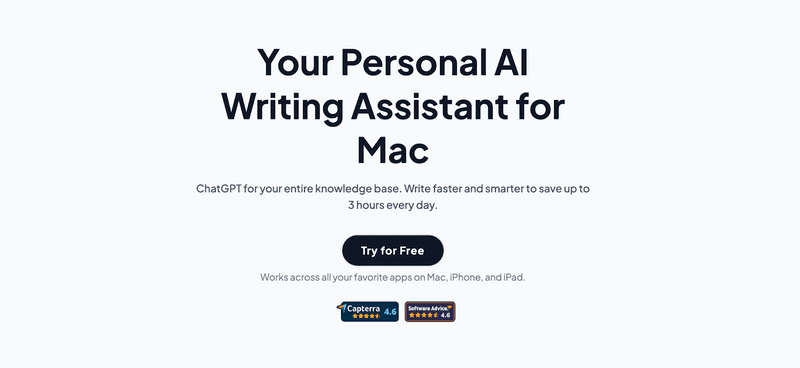
First up, let's talk about Elephas. This one's pretty special! It's like having a super-smart writing buddy right at your fingertips. What's cool about Elephas is that you can choose different AI technologies to work with.
Want to use OpenAI, Claude, or Gemini? No problem!
Or maybe you prefer to keep things private with offline options like LM Studio or Jan AI?Elephas has got you covered.
It even has a web search feature, so you can look up medical info without leaving the app.
And get this - it works offline too!
That means your patient data stays safe and secure. Elephas can help healthcare pros write reports, emails, or research papers super fast.
It can fix grammar, suggest smart replies, and even help you rewrite stuff in different styles. Pretty handy for those busy doctors who need to communicate clearly but don't have much time, right?
Merative
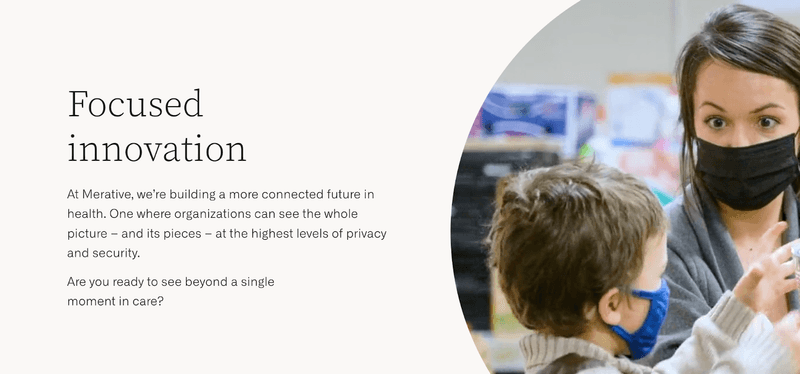
Now, let's check out Merative.
This used to be part of IBM, but now it's doing its own thing. Merative is all about using AI to make healthcare smarter. It's got tools for all sorts of medical areas - like breast imaging, neurology, and more.
What's great about Merative is that it fits right in with the systems hospitals already use. It's like adding a super-smart assistant to the team without messing up how things already work.
Merative helps doctors make better diagnoses faster, manage tons of patient data, and even assist with tricky surgeries. It's like giving healthcare pros superpowers to take better care of patients!
Regard
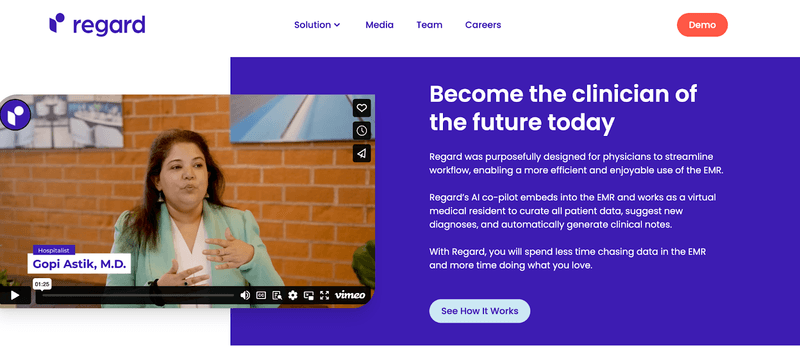
Next up is Regard.
This one's all about making life easier for doctors and keeping patients safer. Imagine having an AI assistant who reads through all the patient info and gives you a quick summary. That's what Regard does!
It looks at a patient's whole health story and suggests possible diagnoses.
This means doctors can spot problems faster and make better decisions.
Plus, it helps with all that paperwork doctors hate doing. Regard writes up detailed notes automatically, so doctors can spend more time actually talking to patients instead of typing on a computer.
Enlitic
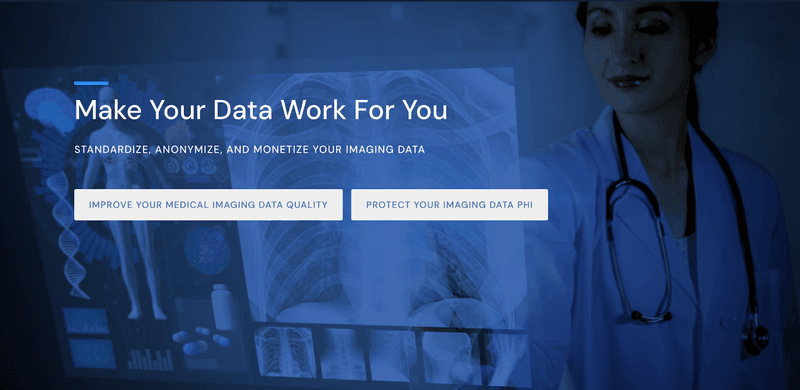
Let's talk about Enlitic now.
This one's a real game-changer for radiologists.
You know how hospitals have tons of X-rays and scans? Enlitic helps make sense of all that stuff.
It uses AI to look at medical images and spot things that humans might miss. But it's not just about looking at pictures - Enlitic helps streamline the whole workflow. It makes sure all the imaging data is organized and easy to understand.
This means doctors can make decisions faster and help patients sooner. It's like having a super-smart partner in the radiology department, making everything run smoother and faster.
Viz.ai
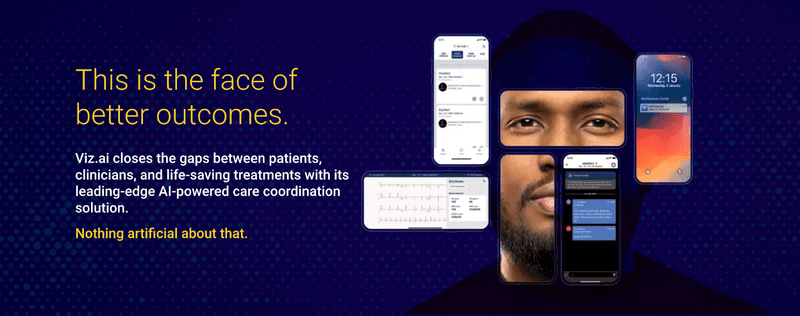
Last but not least, we've got Viz.ai.
This one's a lifesaver - literally! Viz.ai is all about helping stroke patients get treatment fast. When someone has a stroke, every minute counts.
Viz.ai uses AI to look at brain scans super quickly and alert the right doctors right away. It's like having a really fast, really smart alarm system for strokes. This tool helps doctors make quick decisions and get patients the help they need ASAP. It's not just about speed, though - Viz.ai also helps different doctors work together better, making sure everyone's on the same page when it comes to treating the patient.
So there you have it! These five AI tools are really changing the game for healthcare professionals. From writing help and smart diagnostics to faster stroke treatment and better radiology workflows, AI is making healthcare smarter, faster, and better for everyone.
Benefits of AI Tools for Healthcare Professionals

So, what's the big deal about AI in healthcare? Well, it's like giving doctors and nurses a super-smart assistant that never gets tired. These AI tools are changing the game in some pretty cool ways. Let me break it down for you:
1. Saving time (and sanity!):
Imagine being a doctor with piles of paperwork and not enough hours in the day. AI tools can handle a lot of that boring stuff, like writing reports or organizing patient info. This means healthcare pros can spend more time actually talking to patients and less time staring at a computer screen. Nice, right?
2. Catching problems early:
AI is like having an extra set of super-sharp eyes. It can spot tiny details in things like X-rays or lab results that humans might miss. This means doctors can catch health issues earlier, which is huge for patients. It's like having a health detective on the case 24/7!
3. Making smarter decisions, faster:
Healthcare can be tricky, with lots of information to juggle. AI tools can sift through mountains of data in seconds and give doctors a quick summary. This helps them make better decisions faster, which can be a real lifesaver in emergencies.
4. Personalized care:
Everyone's different, right? AI can help customize treatments for each patient. It looks at a person's whole health history and suggests the best options. It's like having a treatment plan designed just for you.
5. Teamwork makes the dream work:
Healthcare often involves lots of different doctors and specialists. AI tools can help them all stay on the same page, sharing important info quickly. This means better teamwork and smoother care for patients.
6. Tackling the big health challenges:
AI is helping researchers crunch huge amounts of data to understand diseases better and find new treatments. It's like having a super-smart scientist working around the clock to solve health puzzles.
So there you have it! AI tools are like super-powered helpers for healthcare professionals. They're making things faster, smarter, and safer. But don't worry – they're not replacing doctors and nurses. Instead, they're giving them more time to do what they do best: taking care of people.
It's pretty exciting to think about how these tools will keep improving healthcare in the future. Who knows? The next time you visit a doctor, you might just see some of this cool AI tech in action!
How Elephas Has Helped One of Our Community Lawyers

We recently had a long chat with a doctor in our Elephas community. As part of a regular customer feedback call, we talked with her and she shared her experiences using Elephas. She told us that she saved almost 20 hours a week because of Elephas. We were quite amazed to hear that and asked if she could share her workflow with us. She was kind enough to share it with us. However, we couldn't actually mention her real name, so let's assume her name is Sarah.
So, Sarah told us she's been using Elephas for about five months now, and it's made a huge impact on her daily routine. "I used to spend hours and hours writing patient reports and research papers," Sarah said. "Now, with Elephas, I can do all that in almost half the time. It's like having a super-smart helper right on my computer!"
Morning Rounds: AI at the Bedside
Sarah starts her day with patient rounds. Using the Elephas AI Keyboard on her iPhone, she quickly jots down important observations and treatment plans. "It's so convenient," Sarah explains. "I can draft notes right there in the patient's room, and Elephas helps me organize my thoughts on the go."
Tackling the Paper Mountain: Smart Write to the Rescue
Back at her desk, Sarah faces a stack of patient reports. This is where Elephas's Smart Write feature shines. "I input key patient data, and Elephas helps me expand it into a comprehensive report," she says. "It's like having a medical scribe who knows exactly what I need!"
Research Made Easy: Super Brain in Action
For her ongoing research projects, Sarah relies heavily on the Super Brain feature. "I upload relevant studies and my own notes," she explains. "When I'm writing, Elephas suggests connections and citations I might have missed. It's like having a massive medical library at my fingertips."
Customize Communication: Rewrite Modes for Every Audience
Sarah's job involves communicating with various audiences. She uses Elephas's different rewrite modes to customize her writing. "For patient letters, I use the Friendly Mode to keep things clear and approachable," she says. "For academic papers, I switch to Professional Mode. It's so versatile!"
Protecting Patient Privacy: Offline Mode for Sensitive Data
When dealing with confidential patient information, Sarah uses Elephas's offline functionality. "I can use AI to help with my writing without worrying about data privacy," she shares. "It's a game-changer for handling sensitive information."
Staying Current: Web Search Feature
Sarah loves the integrated web search feature. "If I need to quickly look up a new treatment or drug interaction, I can do it right within Elephas," she explains. "It saves me so much time switching between apps."
The AI Advantage: Choosing the Right Tool for the Job
One of Sarah's favorite things about Elephas is that she can pick which AI she wants to use. "Some days I use OpenAI, other times I like Claude or Gemini," she explained. "And when I'm working with sensitive patient info, I can use the offline options. It's great for keeping things private," she says. "Having options helps me tackle different types of writing tasks more effectively."
The Bottom Line: More Time for Patient Care
Sarah estimates that Elephas saves her about 20 hours a week. "I'm spending less time on paperwork and more time with my patients," she beams. "I've even been able to take on additional research projects. Elephas has truly transformed my work life."
Sarah's experience showcases how AI tools like Elephas can significantly increase productivity in healthcare settings. By streamlining documentation and research tasks, Elephas allows medical professionals to focus more on what really matters - patient care and medical advancements.
Have you found innovative ways to use Elephas in your healthcare work? We'd love to hear your story too! Share your experience and let us know how Elephas is helping you save time and improve your medical practice.
Conclusion
Wow, can you believe how much AI is changing healthcare? It's pretty amazing stuff, right? These smart tools are like having a super-powered assistant, helping doctors and nurses do their jobs better and faster. From writing reports to spotting health issues early, AI is making a real difference.
But you know what's really cool? Tools like Elephas are making this tech available to healthcare pros like you, right now for free. No need to wait for your hospital to install some fancy, expensive system. You can start using AI today to save time, reduce stress, and focus more on your patients.
Remember Dr. Sarah? She saved 20 hours a week with Elephas! That's like getting an extra day each week. Imagine what you could do with that time.
So, why not give Elephas a try? It's easy to use and free to start, works with your current setup, and could seriously change your work life for the better. Plus, you can use it offline for those sensitive patient details. Ready to see how much time and stress you could save?
FAQs
1. How much time can doctors save using AI tools like Elephas?
Based on user feedback, doctors can save a lot of time with AI tools. One doctor reported saving about 20 hours a week using Elephas. That's like getting an extra day each week! This extra time allows healthcare professionals to see more patients or do more research.
2. Are AI tools for healthcare safe to use with patient information?
Many AI tools, like Elephas, have special features to keep patient info safe. They offer offline modes, so your data stays on your device. This means you can use AI to help with writing and organizing without worrying about privacy issues. Always check the tool's privacy features.
3. Do I need to be tech-savvy to use AI tools in healthcare?
Not at all! Most AI tools for healthcare are designed to be user-friendly. They fit into your normal work routine and are easy to learn. You don't need to be a computer expert to use them. If you can use a smartphone, you can probably use these AI tools.
Comments
Your comment has been submitted